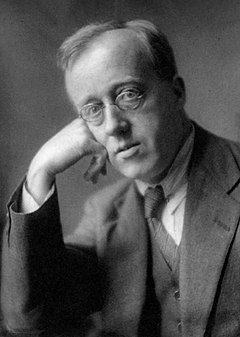2014,為紀念《 The Planets》組曲問世100年
因演唱「Jupiter」而聲名大噪的平原綾香,到了英國
追訪作曲家Gustav Holst的生涯
因演唱「Jupiter」而聲名大噪的平原綾香,到了英國
追訪作曲家Gustav Holst的生涯
古斯塔夫·西奧多·霍爾斯特(英語:Gustav Theodore Holst,1874年9月21日-1934年5月25日),英國作曲家。原名為Gustav(Theodore)von Holst,在第一次世界大戰後去掉了名字中的von。出生於音樂世家,祖先多為英國人,其餘為瑞典人。19歲時,進入倫敦皇家音樂學院,師事查爾斯·威利爾斯·斯坦福五年。1906年後邊擔任倫敦聖保羅(St Paul)女子學校音樂系主任,邊同時進行作曲。在音樂寫作上,除大膽地進行和聲的實驗外,也採用多調的作曲手法。代表作為管弦樂組曲《行星組曲》(The Planets)。
《行星組曲》Op.32, 1914-16[編輯]
- 火星—戰爭之神(Mars - The bringer of war)
- 金星—和平之神(Venus - The bringer of peace)
- 水星—翼信之神(Mercury - The winged messenger)
- 木星—快樂之神(Jupiter - The bringer of jollity)
- 土星—老年之神(Saturn - The bringer of old)
- 天王星—魔術之神(Uranus - The magician)
- 海王星—神秘之神(Neptune - The mystic,附加女聲合唱)
From Wikipedia, the free encyclopedia
Gustav Theodore Holst (born Gustavus Theodore von Holst; 21 September 1874 – 25 May 1934) was an English composer, arranger and teacher. Best known for his orchestral suite The Planets, he composed a large number of other works across a range of genres, although none achieved comparable success. His distinctive compositional style was the product of many influences, Richard Wagner and Richard Strauss being most crucial early in his development. The subsequent inspiration of the English folksong revival of the early 20th century, and the example of such rising modern composers as Maurice Ravel, led Holst to develop and refine an individual style.
There were professional musicians in the previous three generations of Holst's family, and it was clear from his early years that he would follow the same calling. He hoped to become a pianist, but was prevented by neuritis in his right arm. Despite his father's reservations, he pursued a career as a composer, studying at the Royal College of Music under Charles Villiers Stanford. Unable to support himself by his compositions, he played the trombone professionally and later became a teacher—a great one, according to his colleague Ralph Vaughan Williams. Among other teaching activities he built up a strong tradition of performance at Morley College, where he served as musical director from 1907 until 1924, and pioneered music education for women at St Paul's Girls' School, where he taught from 1905 until his death in 1934, raising standards and so laying the foundation for several professional musicians. He was the founder of a series of Whitsun music festivals, which ran from 1916 for the remainder of his life. Holst's works were played frequently in the early years of the 20th century, but it was not until the international success of The Planets in the years immediately after the First World War that he became a well-known figure. A shy man, he did not welcome this fame, and preferred to be left in peace to compose and teach.
In his later years his uncompromising, personal style of composition struck many music lovers as too austere, and his brief popularity declined. Nevertheless, he was a significant influence on a number of younger English composers, including Edmund Rubbra, Michael Tippett and Benjamin Britten. Apart from The Planets and a handful of other works, his music was generally neglected until the 1980s, since when recordings of much of his output have been available.
Contents
[hide]- 1Life and career
- 2Music
- 3Recordings
- 4Legacy
- 5Notes and references
- 6External links

沒有留言:
張貼留言